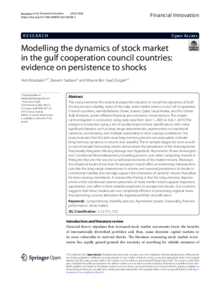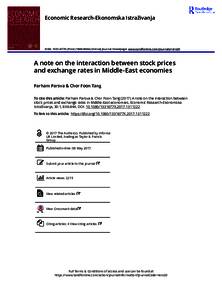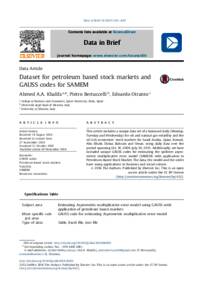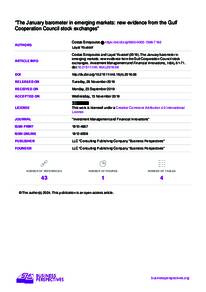Document
Modelling the dynamics of stock market in the Gulf cooperation council countries : evidence on persistence to shocks.
Identifier
DOI: 10.1186/s40854-022-00348-3
Source
Financial Innovation. v. 8, 1, 46
Contributors
Saidane, Bassem., Author
Zorgati, Mouna Ben Saad., Author
Country
Germany.
City
Berlin
Publisher
Springer Science and Business Media Deutschland GmbH.
Gregorian
2022-12-01
Language
English
English abstract
This study examines the statistical properties required to model the dynamics of both the returns and volatility series of the daily stock market returns in six Gulf Cooperation Council countries, namely Bahrain, Oman, Kuwait, Qatar, Saudi Arabia, and the United Arab Emirates, under different financial and economic circumstances. The empirical investigation is conducted using daily data from June 1, 2005 to July 1, 2019. The analysis is conducted using a set of double long-memory specifications with some significant features such as long-range dependencies, asymmetries in conditional variances, non-linearity, and multiple seasonality or time-varying correlations. Our study indicates that the joint dual long-memory process can adequately estimate long-memory dynamics in returns and volatility. The in-sample diagnostic tests as well as out-of-sample forecasting results demonstrate the prevalence of the Autoregressive Fractionally Integrated Moving Average and Hyperbolic Asymmetric Power Autoregressive Conditional Heteroskedasticity modeling process over other competing models in fitting the first and the second conditional moments of the market returns. Moreover, the empirical results show that the proposed model offers an interesting framework to describe the long-range dependence in returns and seasonal persistence to shocks in conditional volatility and strongly support the estimation of dynamic returns that allow for time-varying correlations. A noteworthy finding is that the long-memory dependencies in the conditional variance processes of stock market returns appear important, asymmetric, and differ in their volatility responses to unexpected shocks. Our evidence suggests that these markets are not completely efficient in processing regional news, thus providing a sound alternative for regional portfolio diversification.
ISSN
2199-4730
Category
Journal articles




